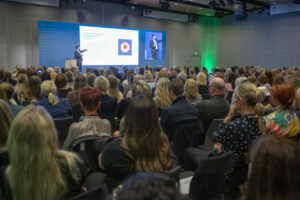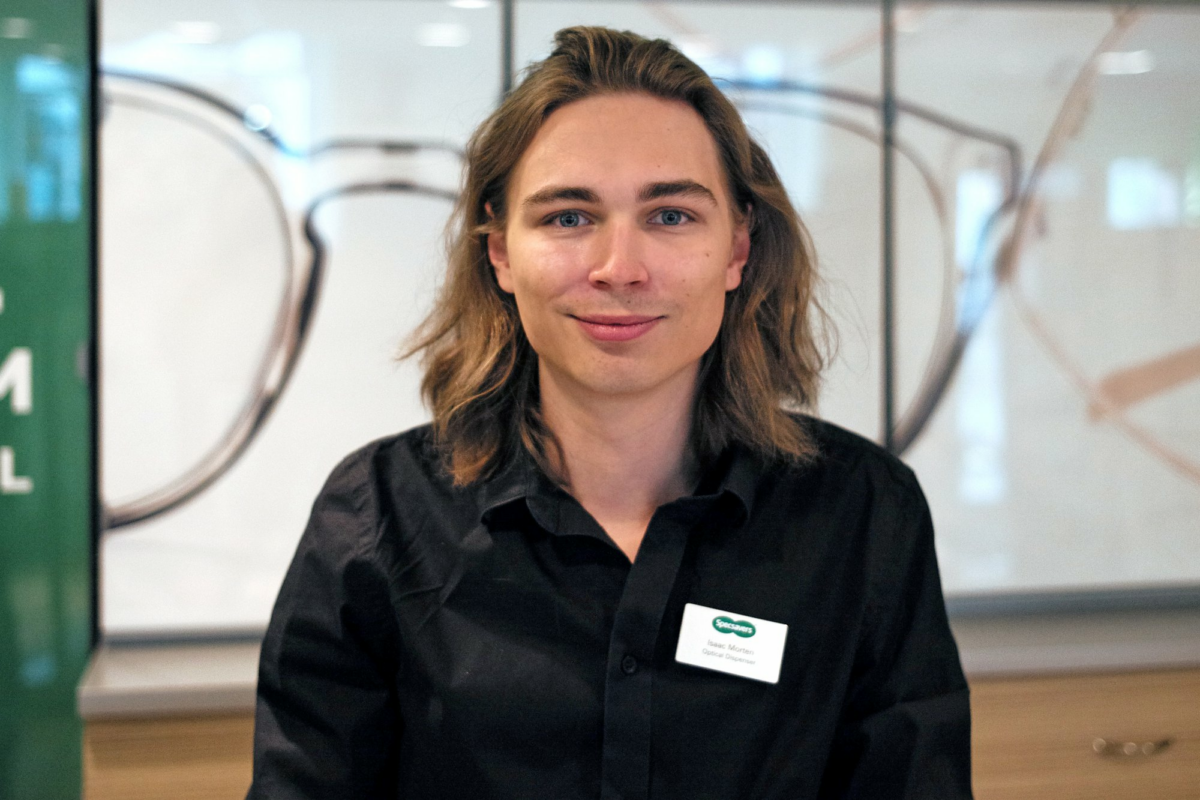Read this story in Swedish
“Having the opportunity to complete the training as a clinic assistant has been so interesting and rewarding,” says Isaac. “Both to learn more about the optical industry, but above all to have the opportunity to be part of the entire customer journey. From welcoming the customer, performing preliminary examinations and assisting in the eye examination to helping the customer choose frames and making adjustments when handing over the glasses. That’s the best,” concludes Isaac, who really aims for every customer to be satisfied and happy with their purchase.
“I really like meeting people”
Isaac’s mother Ann-Charlotte Morten has owned the store in Varberg since Specsavers was established in Sweden in 2004 through the acquisition of around 50 stores from the former optical retail chains Blic and Två Blå. Isaac, 22 years, started working in his mother’s store as an optical assistant and sales employee a couple of years ago – and he really likes meeting people. “Every customer should be satisfied when they leave the store. If they aren’t, they should always have the opportunity to come back. Then we can find out what went wrong and come up with a good solution. It can be an extra sight check to make sure everything is right or an adjustment of the frame.”
“The best thing is all the opportunities for development”
“I first attended the internal course to become an Optical Dispenser – a comprehensive education, where I learned a lot about the optical industry. I also learned about different working methods, for example how to help a customer to find the right frame and lenses and adjustment of glasses. Last year, I attended the clinical assistant training. Our store in Varberg was one of the first to get the chance to start up the Optician On Demand concept and now I have been working as a clinical assistant for about six months.”
“It’s important to be a good listener”
“Since everything is done online, you should never rush but go through everything quite methodically. The optician controls the computer during the eye examination and if I want to do something – for example change the camera – we need to have good communication. You should always try to speak clearly and not too fast and listen carefully to what the optician has to say. I work with many different opticians in the Optician On Demand concept. Sometimes it can be a challenge to learn how a new optician works and thinks. In the beginning, I often worked with the same optician and then you get a nice interaction and understanding of their way of thinking.”
Isaac further explains what qualities he thinks are important as a clinical assistant:
“It’s important to be a good listener and to be emphatic. You should really be able to listen to the customer’s wishes and understand their needs,” says Isaac. “You should always focus on helping the customer and guiding them as much as possible.”
“It makes me happy to see the customer satisfied”
“It can be just by helping a customer to choose the right frame,” says Isaac. But sometimes you might need to come up with special solutions to reach a goal. “I’m currently helping a customer who wears a hearing aid. It can be difficult with hearing aids and glasses because there’s not too much space behind the ears. The customer found a pair of favourite frames that have a larger rear. Unfortunately, the frame squeezed behind her ears with the hearing aid. Then I replaced the plastic part on the sides so that it became narrower but still looks the same. She picked up her glasses yesterday and was really happy. She was able to keep the frame and didn’t have to make any visible changes to it.”
“I feel involved in Specsavers’ goals”
“The frames have high quality and Specsavers has a generous customer satisfaction guarantee. The lenses are also at the forefront of the optics industry. For example, there are lenses specially adapted to reading on your mobile phone, for driving and so on. Customers who used to go to a ‘more expensive optician’, may sometimes be sceptical because our prices are so low. But when they get their first pair of glasses from us, they notice that the quality and warranty terms are just as good.”
“Specsavers’ main goal is to offer good eye care to as many people as possible,” Isaac continues. “When I started to work at Specsavers, I really felt that this is something that permeates the entire company and that I’m part of the process. It’s not just about doing the eye examination and then letting go of the customer. If there’s something they need help with afterwards, they should always be able to come back. Specsavers also collects used glasses to send them to Tanzania. I really think it feels good to be able to help people in different parts of the world.”
What inspires you?
“What inspires me are people who try to share as much joy as possible – and who try to make other people happy. Especially persons in the music world. Another source of inspiration is my parents. They work so hard and manage everything. They are self-employed and at the same time, they manage to take good care of our family and everything else.”
Do you have any thoughts about your future working life?
“We need more opticians in the store, so I have some thoughts about becoming an optician. As I’d love to study abroad, I’m thinking about doing my optician studies in Copenhagen – which is not so far from Varberg. But I also love working in the store and helping customers. I’d prefer to find an intermediate solution so I can both be out on the floor and in the examination room. Then I can get the best of both worlds,” says Isaac with a big warm smile.
Get to know more about what it’s like to work as a clinical assistant at Specsavers in Sweden. Or read more about all store opportunities we have and find out if there are any vacancies that may suit you.



